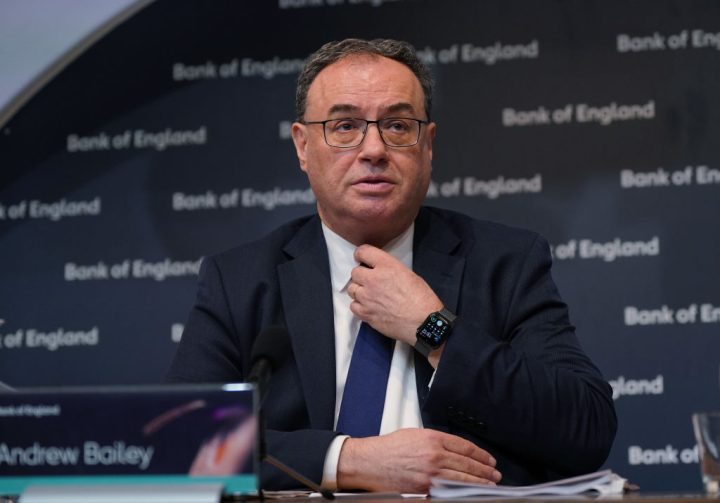Treasury select committee meetings are not usually the stuff of great television. But this morning, it was. The Bank of England’s governor Andrew Bailey was up as a witness to give evidence on recent Monetary Policy reports. And the committee’s new chair, Harriett Baldwin, came ready to highlight where (many) mistakes had been made.
Starting with where we are today – inflation still over 10 per cent, five times the Bank’s target – Bailey was forced to sit and listen to his own record over the past eighteen months. Beginning in May 2021 and moving into that autumn, Baldwin quoted his own warnings about ‘very hot areas of prices’ back to him. She noted that as inflation did indeed start rising – by November 2021 the headline rate of inflation was double the Bank’s target – the Bank was keeping interest rates at record lows. A year ago today, she noted, still before Russia had invaded Ukraine, inflation was at 6 per cent yet rates were at 0.5 per cent: ‘monetary policy was kept very loose,’ said Baldwin, ‘despite the evidence that you gave us’.
Bailey was visibly uncomfortable, shifting, increasingly interjecting as Baldwin told a story filled with plenty of warnings yet very little action. Bailey kept insisting that all these criticisms were only possible with the benefit of hindsight and said ‘we don’t make policy with the benefit of hindsight’ at the Bank.
Baldwin disagreed, repeatedly referring to the ‘contemporaneous’ circumstances at the time – highlighted by Bailey’s own warnings in 2021. A point in Baldwin’s favour, though she didn’t bring it up today, was that the Bank’s outgoing chief economist Andy Haldane was publicly warning of an inflation spiral in summer 2021. It is difficult for the governor, or anyone around him at the time, to claim that there were no signs or warnings that inflation was about to become unmanageable.
Despite all this, Bailey was in no mood to fess up to mistakes. Baldwin laid out big questions at the start of the meeting: ‘Do you accept that the Bank has made mistakes in terms of this tightening cycle? That you started raising rates too late, too slowly and you’ve really let inflation run away in this country, and it will now be harder and more painful to get inflation back to target?’ Bailey never answered them directly.
Rather, Bailey was defensive of his record, including his claims that inflation was transient, because ‘transitory' is a term that, in his view, ‘is easier to apply to a single shock’. He remains convinced it would have been a temporary blip had it not been for Russia’s invasion and the UK’s struggle with a tight labour market.
Bailey is confident that inflation is going to fall rapidly this year. What might slow this down? Apart from the clash between the chair and the governor at the start of the session, the other news out of today’s meeting was the governor’s hints about the link between public sector pay and inflation.
Asked directly if the ongoing demands for inflation-based pay rises in the public sector would ‘help fuel wider inflation’, Bailey admitted ‘I don’t think you can say there’s no effect. I really don’t think you can say that.’ He was hesitant to get too into the details on the topic, insisting that he was ‘not advocating anything at this point…it’s not territory the Bank of England wants to be in’.
Instead, Bailey pivoted to ‘the economics of it’ which he said would have different effects depending how the government were to go about funding those pay rises: ‘it depends on whether you raise taxes or whether you borrow, frankly’.
Despite insisting he needed to be ‘careful’, Bailey did make a strong hint about his feelings on offering inflation-linked pay rises to the public sector. He repeated the need ‘to be forward looking here’ – meaning you have to take into account the secondary effects of boosting wages as prices are coming down. ‘What I would urge…because we think inflation is going to fall very rapidly, [is] that is taken into account.’ It is not an explicit warning about a wage spiral – one that further solidifies inflation – it sounds a lot like calling for pay restraint.
But how seriously will his warning be taken? On the topic of inflation, Baldwin insisted Bailey must ‘forgive the committee for being slightly sceptical of [its] projections given how often we’ve seen those projections turn out to be incorrect’. Indeed, the Bank repeatedly underestimated how high prices would climb.
Nevertheless, it’s clear the government is nervous about the prospect of a wage spiral, remaining as it is in heated battles with public sector unions as they fight and strike for more pay. That doesn’t prove anything: but it does suggest that the Bank’s light warning today will be taken seriously in Downing Street.







Comments